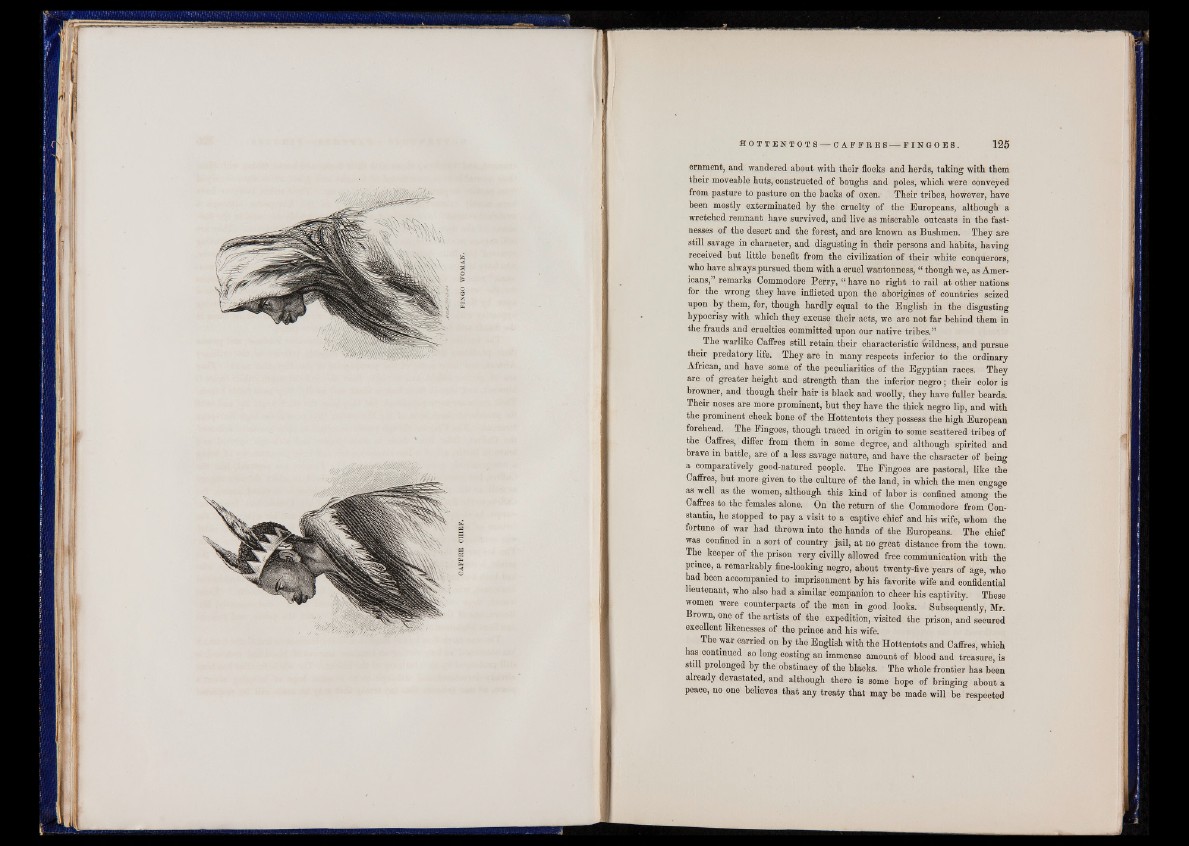
H O T T E N T O T S — C A F F R E S — F I N Q O E S . 125
eminent, and wandered about with their docks and herds, taking with them
their moveable huts, constructed of boughs and poles, which were conveyed
from pasture to pasture on the backs of oxen. Their tribes, however, have
been mostly exterminated by the cruelty of the Europeans, although a
wretched remnant have survived, and live as miserable outcasts in the fastnesses
of the desert and the forest, and are known as Bushmen. They are
still savage in character, and disgusting in their persons and habits, having
received but little benefit from the civilization of their white conquerors,
who have always pursued them with a cruel wantonness, “ though we, as Americans,”
remarks Commodore Perry, “ have no right to rail at other nations
for the wrong they have inflicted upon the aborigines of countries seized
upon by them, for, though hardly equal to the English in the disgusting
hypocrisy with which they excuse their acts, we are not far behind them in
the frauds and cruelties committed upon our native tribes.”
The warlike Caffres still retain their characteristic wildness, and pursue
their predatory life. They are in many respects inferior to the ordinary
African, and have some of the peculiarities of the Egyptian races. They
are of greater height and strength than the inferior negro; their color is
browner, and though their hair is black and woolly, they have fuller beards.
Their noses are more prominent, but they have the thick negro lip, and with
the prominent eheek bone of the Hottentots they possess the high European
forehead. The Eingoes, though traced in origin to some scattered tribes of
the Caffres, differ from them in some degree, and although spirited and
brave in battle, are of a less savage nature, and have the character of being
a comparatively good-natured people. The Eingoes are pastoral, like the
Caffres, but more given to the culture of the land, in which the men engage
as well as the women, although this kind of labor is confined among the
Caffres to the females alone. On the return of the Commodore from Constants,
he stopped to pay a visit to a captive chief and his wife, whom the
fortune of war had thrown into the hands of the Europeans. The chief
was confined in a sort of country jail, at no great distance from the town.
The keeper of the prison very civilly allowed free communication with the
prince, a remarkably fine-looking negro, about twenty-five years of age, who
had been accompanied to imprisonment by his favorite wife and confidential
lieutenant, who also had a similar companion to cheer his captivity. These
women were counterparts of the men in good, looks. Subsequently, Mr.
Brown, one of the artists of the expedition, visited the prison, and secured
excellent likenesses of the prince and his wife.
The war carried on by the English with the Hottentots and Caffres, which
has continued so long costing an immense amount of blood and treasure, is
still prolonged by the obstinacy of the blacks. The whole frontier has been
already devastated, and although there is some hope of bringing about a
peace, no one believes that any treaty that may be made will be respected